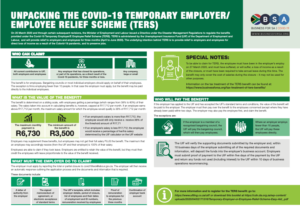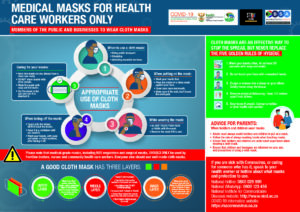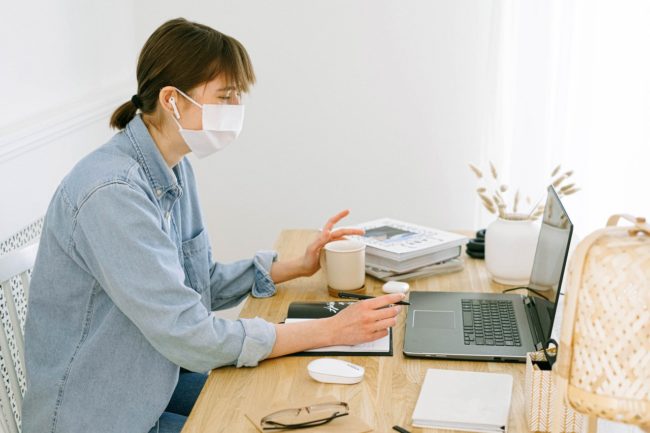In an effort to clear up some confusion regarding the COVID-19 Temporary Employer/Employee Relief Scheme (TERS) benefits, the Minister of Employment and Labour signed an amended Directive on 16 April and a Correction Notice on 20 April 2020 respectively.
It is now clear that employees who were required to take annual leave during the period that the employer’s business was closed (either completely or partially) may claim the COVID-19 TERS benefit. Annual leave days are therefore regarded as no income days for purposes of the benefit. An employer who receives the benefit on behalf of its employees may retain the amount, but must then credit the employee concerned with the proportionate entitlement to annual leave.
The Correction Notice of 20 April 2020 deleted the reference to section 12 of the Unemployment Insurance Act in clause 3.6 of the Directive. This enables employees who receive remuneration in excess of R17,712 per month and whose employers apply top up to claim the benefit. By way of example:
The employee earns R20,000 per month. In terms of the Directive, benefits are calculated as a percentage (38%-60%) of the employee’s salary. However, the salary at which benefits are calculated is capped at R17,712 per month. The employee in this example would accordingly only be able to qualify for the maximum benefit of R6,730.56.
Assume that the employer pays the employee R10,000 during the period of closure.
The amount paid by the employer and the amount of the benefit would be around R16,730.56. This is less than the employee’s normal remuneration of R20,000 and the employee will accordingly qualify for the benefit.
Assume that the employer pays R18,000. In this case, the employee would only receive R2,000 as the benefit, so as to ensure that the employee does not receive more than 100% of her/his normal remuneration of R20,000.
Assume that the employer pays R20,000, i.e. the employee’s normal remuneration, and that the employee is not required to take annual leave. In this case, the employee will not receive a TERS benefit.
On the wording of the Directive prior to this correction, the comparison was made vis-à-vis the threshold amount of R17,712 (and not the employee’s actual remuneration). Thus, if the employer’s top up and the benefit exceeded the amount of R17,712, the employee would not qualify for a TERS benefit. We are informed that the UIF will automatically re-calculate the benefits of employees whose applications were rejected on this basis.
A revised formula which now incorporates this principle can now be found in the revised calculator. A copy of it can be found at
https://www.businessforsa.org/wp-content/uploads/2020/04/TERS-calculator-final.pdf
Employers whose operations are closed and who are applying the no work no pay principle, or who are requiring their employees to take leave, or who are paying only a portion of their employees’ remuneration, are urged to apply for the COVID-19 TERS benefit on behalf of their employees. In these circumstances, the employees are not eligible for unemployment benefits. This is because their employment has not yet been terminated. Only if they are in fact dismissed, will employees qualify for unemployment benefits.
We are informed that where the application has been incorrectly made for unemployment benefits, the UIF may be approached to correctly classify the benefits as COVID-19 TERS benefits, and in these circumstances, the employee’s credits will be reinstated.

CLOTH MASK DEMAND TO BOOST SOUTH AFRICAN LOCAL MANUFACTURING
ProudlySA Marketplace to link local cloth mask manufacturers to corporate buyers
Corporate buyers/consumers can visit https://www.proudlysa.co.za/covid_19/covid_19.php
Manufacturers wishing to register on the portal can email: bongani@proudlysa.co.za
Proudly SA has launched a dedicated marketplace online portal for cloth masks, which connects corporate buyers with local producers of cloth masks.
Boost for local manufacturing, textile and CMT industries
It is the culmination of the Department of Trade, Industry and Competition (DTIC), SA Clothing and Textile Workers Union (SACTWU) and the Manufacturing Circle’s drive to capacitate, retool and reinvigorate the local clothing and textile manufacturing industry, and to generate opportunities for SMEs, so that they are able to participate in the economy, save and create jobs, and remain resilient in the tough economic times ahead.
Many local manufacturers of clothing and textiles have repurposed their production capability and machines to produce cloth masks. Government is urging cloth mask manufacturers to only use locally produced textiles.
The demand for cloth masks is aligned with Government’s announcement that all medical-grade masks, including N95 respirators and surgical masks, be reserved for frontline health care workers, who are our only line of defence against the virus. The President announced this week that all passengers travelling on public transport will be required to wear a non-medical or cloth mask. It is also recommended that all citizens wear a cloth mask outside of their homes.
Business for South Africa (B4SA) welcomes the DTIC, SACTWU and the Manufacturing Circle’s intervention and leadership, and believes it will not only spur local manufacturing in the textile and CMT industries, but will also provide the country with the volumes of cloth masks needed to protect its citizens and health workers.
This is an incredibly important initiative that will provide real solutions for two of the most pressing challenges we have in South Africa at the moment: ensuring that our citizens, and most importantly, our frontline health care workers are protected against the Covid-19 virus; and to ensure critical sectors in the local market are able to weather the economic storm. As Business for SA, we congratulate the Minister and his team, as well as SACTWU, the Proudly SA team and the Manufacturing Circle, for their work in this regard.
Given our Government’s call-to-action around wearing cloth masks, there may be many companies in South Africa with excess medical-grade PPE, including N95 and surgical masks, gloves, goggles and visors, gowns, aprons and overshoes. These companies can be a force for good, by either diverting or donating their stock. This stock will be used to protect our frontline doctors, nurses and community health care workers. If we protect them, they will be able to protect us.
Companies asked to donate medical grade PPE in national interest
To donate medical-grade PPE: http://covid19manager.co.za
Manufacturers urged to use locally produced textiles
The DTIC has developed guidelines for the production of cloth masks by textile and CMT companies:
http://www.dti.gov.za/news2020/Guidelines_Masks.pdf

BUSINESS FOR SOUTH AFRICA PAPER ON LOGISTICS INDUSTRY
Business for South Africa (B4SA) has written a paper to provide an overview of the logistics industry in South Africa. The aim of the paper is to highlight the importance of the industry during this critical time of national disaster. B4SA agrees with the sentiments expressed by the International Maritime Organization (IMO) stating that “it is vital that Governments facilitate the continuing operation of shipping and ports under their jurisdiction to allow the transport of marine cargoes so that supply chains are not disrupted and to allow the global economy, and society as a whole, to continue to function throughout the pandemic”. The paper outlines the logistics industry in the South Africa and shows the critical role it plays in the economy and across sectors. It highlights risks, complexities and main activities in the industry with specific focus on their application during the COVID-19 pandemic.
The paper can be accessed on the B4SA website at https://www.businessforsa.org/economic/supply-chain-security/ and may be shared broadly across the industry.

FOLLOW US ON SOCIAL MEDIA
https://twitter.com/businessforsa
https://www.facebook.com/Business-for-SA-110191343959451/
https://www.linkedin.com/company/businessforsa
OFFICIAL GOVERNMENT REGULATIONS AND GUIDELINES ON COVID-19
All official government regulations and guidelines are available at https://www.gov.za/coronavirus/guidelines
